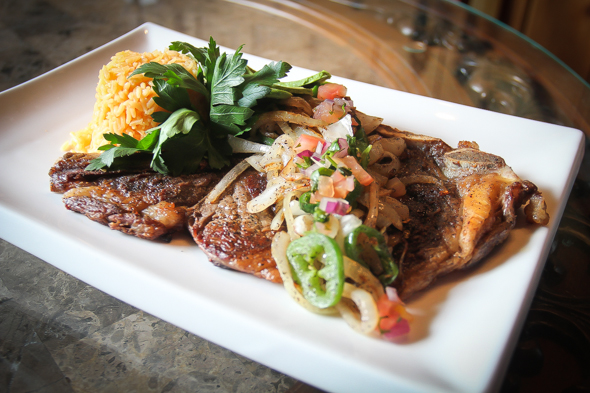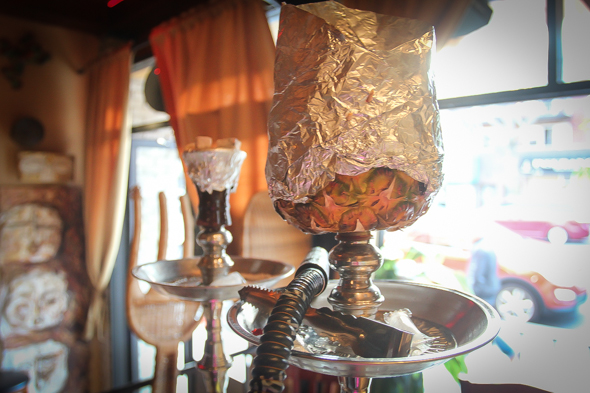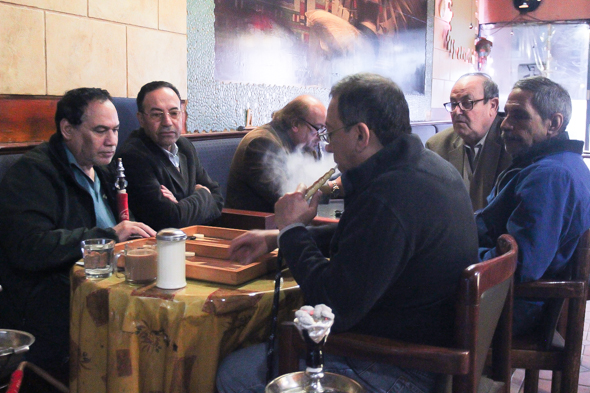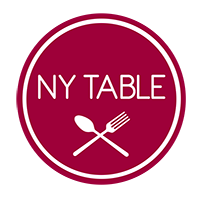Cultures Collide at Astoria’s Hookah Lounges

Mexican inspired menu at La Canela Restaurant and Hookah Lounge. Photo: Esha Mahajan.
By Esha Mahajan
It’s Monday night, but Firdos Grill and Cafe at Steinway Street in Astoria, Queens, is packed with college students and young professionals. They fill the tables at the dark restaurant, pulling on the colorful pipes of their hookahs. They exhale the smoke, sometimes in the shape of rings, and the loud music drowns the sound of the bubbling water in the base of the hookahs. Firdos is one of the roughly two dozen hookah bars and cafes that line one block, just north of 28th Avenue.
When Kamran Syed, whose parents are from Lahore, Pakistan, opened Firdos around six years ago, he knew he had to stand out from the glut of hookah restaurants on the street. That’s when he decided to offer a menu that he felt was unique — hummus with pita or naan, and chicken pakoras, cheeseburgers and chicken makhani subs, tandoori chicken tikka and jalapeño poppers. Dessert is a chocolate chip cookie sundae or a falooda ice cream, a south Asian specialty. He calls the cuisine Persian-Arabic-desi (desi is a blanket term that typically refers to the Indian subcontinent).
Their chef is Arab at the moment, but nationality isn’t one of the criteria for employment. “We’ve trained Indian, Afghani, even Spanish workers to cook the recipes, and Spanish and American ones to make hookah,” says Syed.
Since they don’t serve alcohol, the fusion food, he says, is a way to attract a younger clientele. Everything in the restaurant seems directed toward that demographic — “Time of my Life” by the Black Eyed Peas blares over the speakers, three wall-mounted flat screens play a Knicks versus Mavericks game, and the ceiling lights change color from red to orange to green to blue. A group of Indian students eating falafel and chicken makhani scream in excitement when a Punjabi number comes over the speakers.
A few doors down from Firdos is La Canela, a hookah lounge serving Mexican-halal cuisine, which played music by a popular band from Pakistan on a recent night. The playlist typically goes from ethnic to electronica within minutes. “This neighborhood has many Muslim people who cannot usually eat at Mexican restaurants,” says Farazuddin, the manager.
Green and red laser lights spiral across the restaurant, stained glass lamps sit on the counter tables, and artificial plants stand against the orange, green, and yellow walls. A group of college students pass around a hookah that smells faintly of peach, and click selfies with their smartphones.

Pineapple hookah bowl at La Canela Restaurant and Hookah Bar. The flavor is filled inside a hollowed pineapple, instead of the traditional clay bowl. Photo: Esha Mahajan.
Like Firdos, La Canela doesn’t serve alcohol — both restaurants are owned by Muslims, and alcohol is forbidden in Islam — which can be a problem on the weekends. Newer places on the block boldly advertise cocktail happy hours, belly dancers, and flavored hookah on the chalkboard at the door.
Hookah, also called water pipe or shisha, consists of a bowl filled with flavored tobacco, which is then covered with a layer of perforated foil that holds hot charcoal. When one inhales through the pipe, the hot air vaporizes the tobacco and produces smoke. The smoke passes down to the hookah vase, which is filled with water that cools the smoke. Smokers then inhale and exhale the smoke, filling the air with an aromatic haze.
Unlike many other trends, hookah smoking has endured, even grown. Egyptian Coffee Shop, which opened in Queens in 1997, claims to be the first hookah lounge in the United States. Since then there have been many other, including the night club Purlieu, which opened in Queens last year and sells $30 hookah — around three or four times the price of hookahs at other lounges in Queens.
Hookah’s popularity doesn’t make it a harmless social activity. According to the World Health Organization, hookah smoke contains toxic substances that can cause lung cancer, heart diseases, and other diseases. Hookah smokers inhale more deeply and have longer smoking sessions than a cigarette smoker — the time they spend smoking in a single session may be equal to smoking 100 or more cigarettes. The U.S. Center for Disease Control says that passing the plastic mouthpiece from one person to another also increases the risk of tuberculosis, and viruses like herpes and hepatitis.
Hookah smoking has ancient roots in the Indian subcontinent, and the Ottoman empire, which includes countries such as Turkey, Egypt, Jordan, and Syria, which might contribute to Queens being a de facto hub for hookah. According to the American Community Survey between 2008 and 2012, Queens had largest Arab population of New York City’s five boroughs, and was ranked seventh statewide. Sixty-five per cent of Indian New Yorkers live in Queens.
Labib Salama, who is from Cairo, Egypt, began the Steinway Street hookah phenomenon when he began to miss the Egyptian cafes he would visit everyday. His wife didn’t like the smell of tobacco at their home, and so he opened the Egyptian Coffee Shop in 1997.
The coffee shop is more living room than restaurant. An Arabic television show murmurs in the background, customers play backgammon or do the crossword, and stay for hours. “You feel you are in Egypt,” says Samy Elsharkawy, a limousine driver from Alexandria, Egypt, who visits the cafe from his Brooklyn home every day. “This is exactly what is looked like back home.”

Labib Salama smokes hookah and plays backgammon with regular customers at the Egyptian Coffee Shop. Photo: Esha Mahajan.
The newer places have affected Salama’s business — he now earns about $200 a day, instead of $2,000 — and he calls the sheer number of hookah bars “stupid.” Salama, who also owns three yellow cabs, which he leases out, says the cafe is more a place for him to smoke than a source of income. “I would have closed years ago if my business was only hookah. Earlier I had 200 customers; now everybody has 20 or 30.”
Pictures of Gamal Abdel Nasser, Egypt’s second president, and flyers of protests from 2013 cover the cafe window, blotched with marks from scotch tape. Arab newspapers lie carelessly on a corner table, and cups of mint tea or black coffee sit at every table. There is no food. Salama is Christian, and won’t serve halal to his largely Muslim customer base.
Across the street at the other end of the block is Elkayam, the “godfather of shisha,” as it says on the board outside, which opened in 1998. It doesn’t serve food either, and looks a lot like Egyptian Coffee Shop, albeit less shabby. Customers walk in with chicken and rice from a nearby food truck or order in. Smoking individual hookahs made by a Mexican staff member — traditional ones without flavor or foil to separate the coal from the tobacco — are an Egyptian, an Arabian, a Lebanese, a Saudi Arabian, and a Palestinian, each at his own table. They’ve all met coming here over time, and it’s a community space for them now. “We sleep here sometimes,” says Hosni Shahata, a limousine driver who moved here from Cairo 37 years ago. He’s petite and middle-aged, with a beard, and was once a popular whirling dervish dancer. A friend sitting next to him watches a belly dancing video on a touchscreen cellphone.
The customers at the Queens’ traditional hookah cafes seem to be in search of a piece of home. Mohamed Saad Abdalla, and Egyptian who makes hookah at Elkayam, says almost all the customers are from Egypt, Morocco, or Lebanon. Many order the unflavored hookah, which the newer lounges don’t offer. The new hookah bars even use hollowed out pineapple or grapefruit as the hookah bowl. For many of the younger, more diverse customers of the these places, hookah is often an excuse to socialize and spend time with their friends.
The New York City Smoke-Free Air Act prohibits tobacco smoking in many public places, except registered “tobacco bars.” Hookah bars don’t fall into this category, but many, like Firdos and La Canela, fall into a grey area because they claim to sell herbal flavors that don’t contain tobacco. Salama says he sells “tobacco but not tobacco” for sake of the law.
Tags: Astoria, hookah, little egypt, steinway

Your Comments